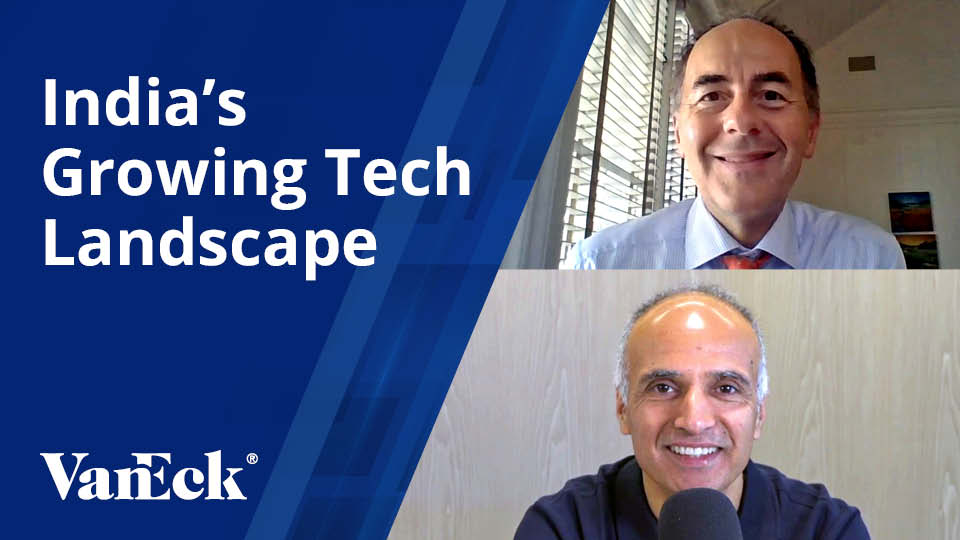Unlocking Vietnam: Investing in a Modernizing Economy
21 February 2024
Watch Time 3:14 MIN
JP Lee: My name is JP Lee, I'm a product manager at VanEck. Very happy to have Steven Schoenfeld from MarketVector Indexes with me today. And we're going to be talking about Vietnam, what the opportunity is there and how to invest. Stay tuned.
Vietnam’s Powerful Economic Story
Steven Schoenfeld: Vietnam is one of the most dramatic transformations of a very impoverished country that survived a war, heading rapidly into a middle income economy. It's got a young and dynamic population rapidly moving into the middle class. It has signed a number of trade deals and it has a significant amount of foreign direct investment coming into the country.
What many investors don't realize is Vietnam is more of a domestic demand story than even export. So while the export and internationally facing part of the economy keeps growing, this country of 100 million plus has a huge domestic market and that market is modernizing. The population is moving up the education curve, the consumption curve. And if you look at the leading stocks in the country, the majority of them are heavily domestic exposure.
Vietnam is still a communist country by governance, but it has increasingly developed a capitalist economy, an equity and fixed income market that operates on international standards, attracts foreign investment as well as local investment. You have IPOs of both state-owned companies and family-owned companies, and increasing interest both by foreign investors and local investors.
Currently, Vietnam is considered one of the more advanced frontier markets by most global index providers, including ourselves, MarketVector. It has many characteristics of an emerging market, including number of companies and size, but it still has some operational constraints, legal constraints that it needs to get through in order to be formally graduated.
A number of index providers, including FTSE, are considering it for 2024 or 2025. But certainly by the end of the decade, it will become an emerging market, in my opinion. And when that happens, it will attract significant foreign investor flows. As investors have shied away from allocation to China, many are looking for a robust and dynamic allocation and Vietnam could very much serve that role.
JP Lee: The VanEck Vietnam ETF, ticker VNM, provides access to local, domestically-focused Vietnamese companies. As we've gone over, Vietnam is a compelling investment story with a number of different tailwinds supporting economic growth. And what's important here is that the top holdings in VNM generate the majority of the revenue from Vietnam, meaning that VNM investors are getting actual exposure to the local economy.
Related Insights
IMPORTANT DEFINITIONS & DISCLOSURES
This material may only be used outside of the United States.
This is not an offer to buy or sell, or a recommendation of any offer to buy or sell any of the securities mentioned herein. Fund holdings will vary. For a complete list of holdings in VanEck Mutual Funds and VanEck ETFs, please visit our website at www.vaneck.com.
The information presented does not involve the rendering of personalized investment, financial, legal, or tax advice. Certain statements contained herein may constitute projections, forecasts and other forward looking statements, which do not reflect actual results. Information provided by third-party sources are believed to be reliable and have not been independently verified for accuracy or completeness and cannot be guaranteed. Any opinions, projections, forecasts, and forward-looking statements presented herein are valid as of the date of this communication and are subject to change without notice. The information herein represents the opinion of the author(s), but not necessarily those of VanEck.
The views contained herein are not to be taken as advice or a recommendation to buy or sell any investment in any jurisdiction, nor is it a commitment from Van Eck Associates Corporation or its subsidiaries to participate in any transactions in any companies mentioned herein. This content is published in the United States. Investors are subject to securities and tax regulations within their applicable jurisdictions that are not addressed herein.
All investing is subject to risk, including the possible loss of the money you invest. As with any investment strategy, there is no guarantee that investment objectives will be met and investors may lose money. Diversification does not ensure a profit or protect against a loss in a declining market. Past performance is no guarantee of future results.
Related Insights
05 June 2024
